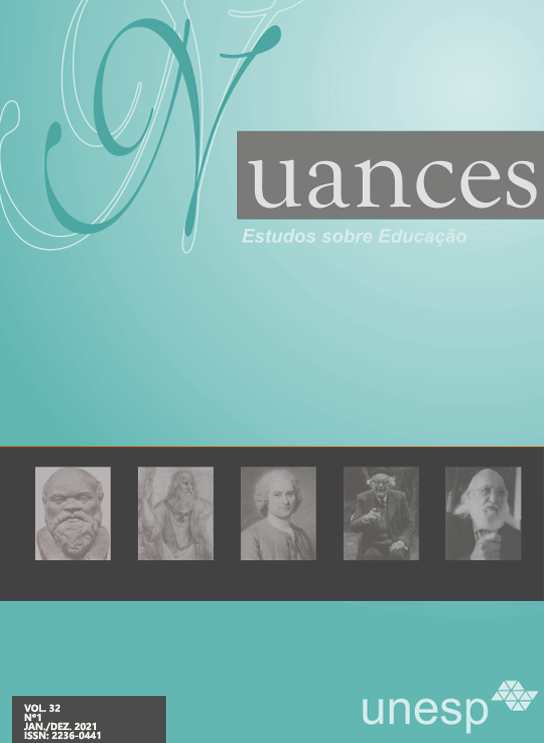Employment and labor adaptation of Russian University graduates with disabilities
DOI :
https://doi.org/10.32930/nuances.v32i00.9127Mots-clés :
Employment, Social and labor adaptation, Job satisfactionRésumé
The article is devoted to the analysis of the problem of social and labor adaptation and employment of university graduates with disabilities, which is relevant in modern socioeconomic conditions. As a result of the sociological research conducted by the authors, the main difficulties that arise for this category of graduates when searching and choosing a job and further employment have been identified. The analysis allows proposing, as an activation of the implementation of the principles of inclusion, an adaptation of social space for effective socialization of the increasing number of people with disabilities in recent decades and their integration into the big society, introducing promising foreign practices of the so-called supported employment of persons with disabilities.Téléchargements
Références
CURCIC, S.; GABEL, S. L.; ZEITLIN, V.; CRIBARO‐DIFATTA, S.; GLARNER, C. Policy and challenges of building schools as inclusive communities. International Journal of Inclusive Education, Leeds, v. 15, n. 1, pp. 117-133, 2011. https://doi.org/10.1080/13603116.2010.496206
FEDERAL STATE STATISTICS SERVICE. Official site. n.d. Available: https://www.gks.ru
FEDERAL STATE STATISTICS SERVICE. [Social status and standard of living of the population of Russia]. Moscow: Rosstat, 2019. In Russian.
KOZYREV, P. M. (ed.). [Bulletin of the Russian monitoring of the economic situation and health of the population of the Higher School of Economics (RLMS HSE): A collection of articles]. Issue 10. Moscow: Higher School of Economics, 2020. In Russian.
MAXIMOVA, O.; BELYAEV, V.; LAUKART-GORBACHEVA, O.; NAGMATULLINA, L.; HAMZINA, G. Russian Education in the Context of the Third Generation Universities’ Discourse: Employers’ Evaluation. International Journal of Environmental and Science Education, London, v. 11, n. 16, p. 9101-9112, 2016. Available: http://www.ijese.net/makale/1150.html. Access: 18 Dec. 2021.
[PERSPEKTIVA – REGIONAL PUBLIC ORGANIZATION OF PEOPLE WITH DISABILITIES]. Available: https://perspektiva-inva.ru/. Access: 18 Dec. 2021. In Russian.
RIDDELL, S.; WEEDON, E. Disabled students in higher education: Discourses of disability and the negotiation of identity. International Journal of Educational Research, Belfast, v. 63, p. 38-46, 2014. https://doi.org/10.1016/j.ijer.2013.02.008
RUSSIA. Law No. 181-FZ, of 24 November 1995. On social protection of disabled people in the Russian Federation. Available: https://www.consultant.ru/document/cons_doc_LAW_8559/. Access: 17 Dec. 2021.
RUSSIA. Law No. 273-FZ, of 29 December 2012. On education in the Russian Federation. Available: https://www.consultant.ru/document/cons_doc_LAW_140174/. Access: 17 Dec. 2021.
SAINSBURY, R. Labour Market Participation of Persons with Disabilities – How can Europe Close the Disability Employment Gap? In: WANSING, G.; WELTI, F. The right to work of persons with disabilities – International Perspectives. Baden-Baden: Nomos, 2018. p. 135-154. https://doi.org/10.5771/9783845291673-134
SLAUGHTER, S.; LESLIE, L.L. Academic capitalism: politics, policies, and the entrepreneurial university. Baltimore: Johns Hopkins University Press, 1997.
TATARSTAN. Cabinet of Ministers. [Order No. 1012-r, of 17 August 2009. On measures to implement the rights of disabled children to receive primary and secondary vocational education]. Tatarstan, N 33, Item 1375, 17 Aug. 2009. In Russian.
WCIOM. Samye privlekatelʹnye rabotodateli Rossii: narodnyj rejting [The most attractive employers in Russia: national rating]. WCIOM, Moscow, 2020. Available: https://old.wciom.ru/index.php?id=236&uid=10674. Access: 24 Jan. 2021.
Téléchargements
Publiée
Comment citer
Numéro
Rubrique
Licence
Atribuição-NãoComercial
CC BY-NC
Esta licença permite que outros remixem, adaptem e criem a partir do seu trabalho para fins não comerciais, e embora os novos trabalhos tenham de lhe atribuir o devido crédito e não possam ser usados para fins comerciais, os usuários não têm de licenciar esses trabalhos derivados sob os mesmos termos.





